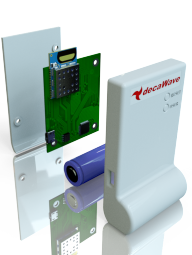
Accurate and robust localization of devices in indoor environments is a challenging task, as GPS is not available. A new generation of ultra-wideband radio transceivers allows highly accurate positioning with cm-level accuracy. The number of anchors available at a given site will further reduce the uncertainty about the actual position of an agent, whose position is to be determined. When the agent moves, the geometric configuration of the anchors becomes another factor that influences how good the target can be localized.
The goal of this bachelor project is to set up a scalable indoor positioning system using a variable number of decaWave ultra-wideband transceivers. A first task will be the setting up of the system and an initial evaluation of the performance. Then, different localization algorithms, e.g., tri-lateration, multi-lateration, shall be implemented. Finally, the performance of the different algorithms shall be evaluated and compared to the standard decawave implementation.
Klaus Witrisal, witrisal@tugraz.at
Jakob Möderl, jakob.moederl@tugraz.at